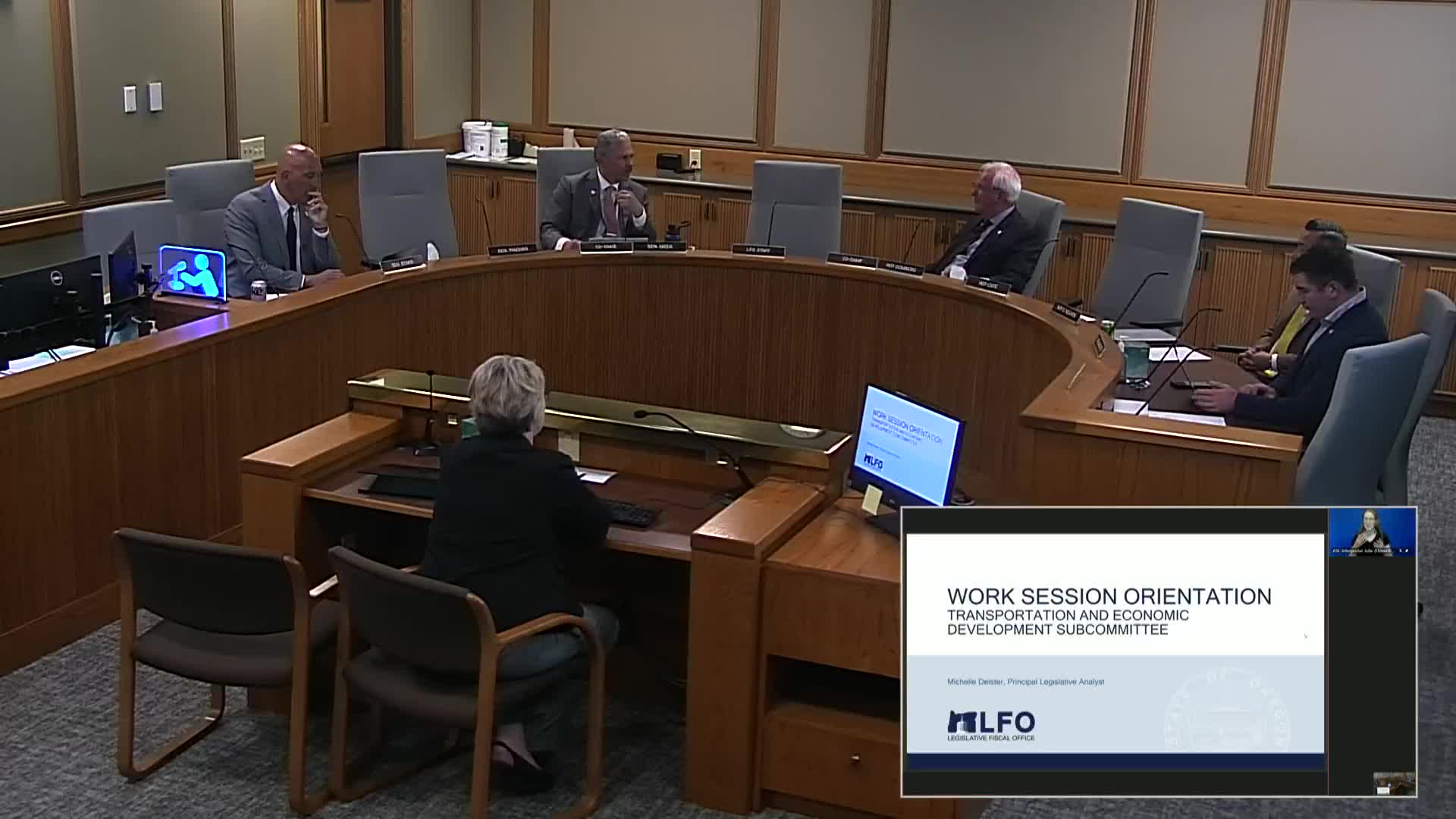Subcommittee Gets Orientation on Budget bills, Amendments, Key Performance Measures and Posting Rules

Summary
The Transportation and Economic Development Subcommittee on April 28 held an informational orientation from the Legislative Fiscal Office covering how budget measures are structured, how work‑session votes and amendments will be handled, key performance measures, budget notes and required posting timelines ahead of upcoming budget work sessions.
The Transportation and Economic Development Subcommittee held an informational orientation Monday to explain how agency budget measures and Legislative Fiscal Office (LFO) recommendations will be presented and handled during upcoming budget work sessions.
Michelle Dicer, principal legislative analyst for the Legislative Fiscal Office, told the subcommittee that primary budget measures are organized by fund type and that members should expect LFO recommendations, posted amendments and accompanying materials on OLIS in advance of votes. “You will actually see an amendment posted on OLISS that will need to be adopted in order to move the budget to full Ways and Means,” Dicer said.
The orientation reviewed why the timing and format matter: budget bills generally take effect on passage but are operative when the biennium begins, and appropriation measures commonly list one appropriation by fund type—general fund, other funds, lottery funds and federal funds—rather than by detailed expenditure categories. Dicer walked members through examples of program‑structured appropriation language and policy option package numbering (070, 080, 090, 100 series), and explained how those packages show up in the LFO recommendation and the work‑session packet.
Dicer explained the typical work‑session process: there is no public testimony during work sessions, agencies do not normally make new presentations but may be called to answer questions, and the subcommittee will make separate recommendations on each piece of the recommended budget that then go to the full Ways and Means Committee. She said the subcommittee will generally take a single motion to adopt the LFO recommendation (which will include policy option packages and technical adjustments), a vote on key performance measures, and a vote to forward the packet to the full committee.
The presentation covered posting and amendment rules. Dicer said subcommittee materials and amendments are posted on OLIS and that amendments must be posted at least four hours before a work session; LFO balancing amendments are typically included as part of a larger packet. She urged members to raise substantive changes early because late changes require reconciling many interdependent budget tables.
The briefing described key performance measures (KPMs) and budget notes. Dicer said KPM reports list targets and whether a measure is new or existing and that KPM changes or deletions are noted in a separate report appended to the budget report. On budget notes she said: “They are not intended to supplant or replace policy measures or law ... They don't have the force of law. They are usually reporting measures.” Budget notes are included in the budget report adopted by the subcommittee and forwarded with the bill packet.
Committee members asked procedural questions about where fiscal impacts from policy bills appear and how policy option packages are handled. Dicer replied that policy bills are generally considered separately from agency budget bills and may arrive later in session as additive items; members will see agency base budgets and any policy option packages on top of that in the LFO materials.
Members raised questions about expenditure limitations and unspent balances. Dicer explained that other funds and federal funds limits are ceilings (maximums) and are not obligations to spend; unspent general fund amounts at the end of the biennium revert and are available in the next biennium. She also noted controls used by the Department of Administrative Services, such as a quarterly allotment process, intended to prevent agencies from exceeding expenditure limitations.
The orientation closed with scheduling notes: the subcommittee may meet again the following week for one or two other‑fund budgets, and members were asked to monitor OLIS for postings and meeting notices.
While the session contained procedural instruction rather than formal policy votes, Dicer repeatedly urged members to raise substantive concerns early so LFO staff can incorporate them into recommendations before packets are finalized and posted to OLIS.

